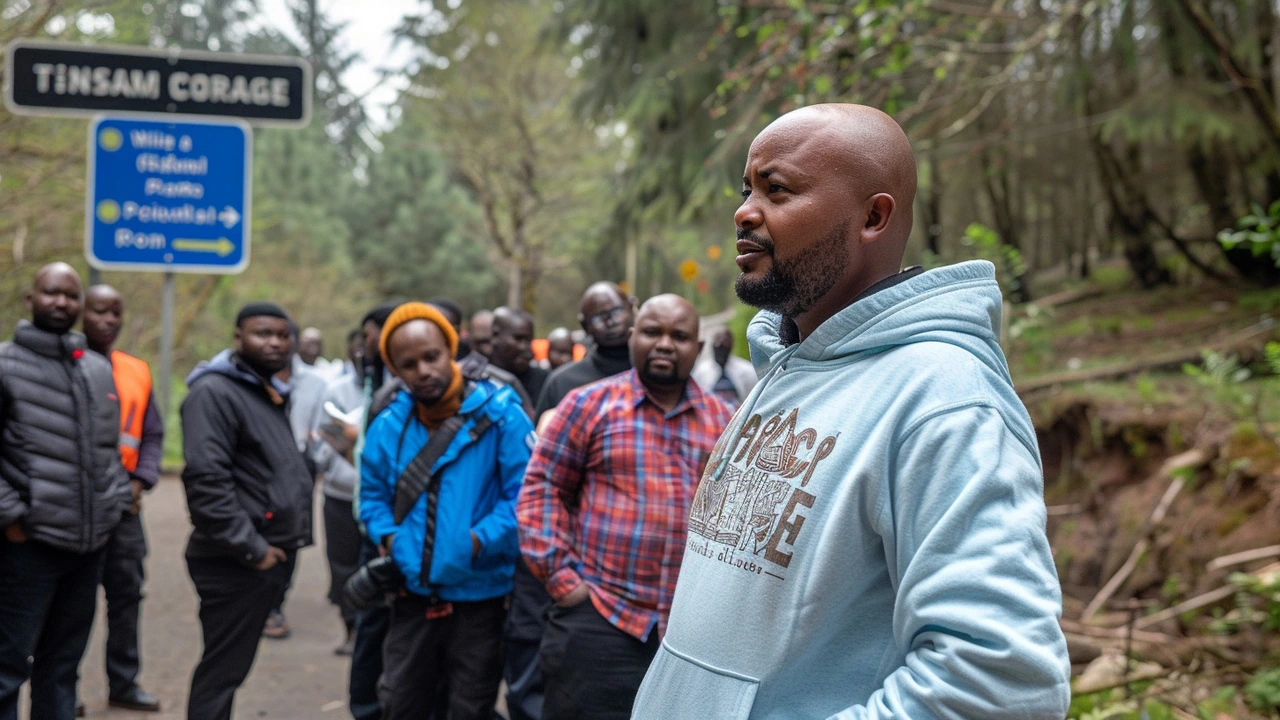In a striking scene of civil unrest, retired Chief Justice Willy Mutunga has taken to the streets alongside prominent activists, notably Boniface Mwangi, to lead a protest against the Finance Bill 2024. The protest, which has gained widespread attention, is centered at the Directorate of Criminal Investigations (DCI) headquarters on Kiambu Road, Nairobi. The group, which also includes Hussein Khalid, Executive Director of Haki Africa, and Hanifa Adan, has stepped forward with a petition in hand, decrying the resurgence of abductions by security officers—an issue that has plagued civil society and led to mounting tensions.
The demonstration is not just a spontaneous outcry but a calculated stance against what they see as governmental overreach and suppression of their constitutional rights. Mutunga, Mwangi, and their fellow activists are adamant about continuing their protests until their grievances are adequately addressed. In a nation where the right to peaceful protest is enshrined in the Constitution, their defiance serves as a stark reminder of the democratic liberties they are fighting to uphold.
Standing at the barricades, 200 meters from the main gate of the DCI headquarters, these activists present a resolute front. Their demands are clear-cut: they call on the DCI to either arrest them on the grounds of their peaceful activism or allow them to carry on with their protests without interference. This moment has galvanized not just the participants but also the public, with many closely watching how the authorities will respond to this peaceful act of defiance.
Resurgence of Abductions
One of the key issues driving this protest is the claim of resumed abductions, an alarming trend that has seemingly taken a toll on activists and civilians alike. President William Ruto, during his campaign, had given a solemn promise to put an end to such abductions, which he attributed to rogue elements within the security forces. However, the activists argue that these abductions have seen a resurgence, undermining the President's commitment and eroding public trust in the administration.
Hanifa Adan, one of the key figures in the protest, shared harrowing accounts of abductions in the coastal region of Kenya, alleging that security officers have been involved in unlawful detentions and forced disappearances. Her testimonies emphasize the need for transparency and accountability within the security agencies, adding weight to the group's demand for decisive action against those responsible.
Finance Bill 2024: A Contentious Issue
The Finance Bill 2024, another critical aspect fueling the protest, has been met with widespread opposition across various segments of society. The bill proposes significant changes in taxation that many argue will further burden the average Kenyan. Willy Mutunga, drawing from his vast experience in law and governance, has joined the chorus of dissent, pointing out the potentially draconian effects of the bill on the livelihoods of many Kenyans. He stresses that the bill, in its current form, could exacerbate economic inequalities and stifle the growth of small businesses.
Boniface Mwangi, known for his unabashed activism and fearless critiques of governmental policies, has been unrelenting in his opposition to the bill. He highlights that the bill, if passed, would drain resources from the already struggling populace, forcing many into even greater financial hardship. Mwangi's involvement has stirred emotional responses from supporters, amplifying the sense of urgency and the need for collective action.

Tightened Security at DCI Headquarters
In response to the protests, the DCI headquarters has witnessed a significant beef-up in security. Police have set up barriers well ahead of the main gate, restricting the protesters' movement and ensuring they maintain a safe distance. This measure, according to authorities, is intended to prevent any disruptions or potential threats to the facility's security.
Despite these restrictions, Mutunga, Mwangi, and Khalid were granted access into the headquarters, accompanied by their legal representatives. Inside, they were able to officially present their petition, outlining their grievances and calling for immediate action to address the issues of abductions and the contentious Finance Bill. The permission to enter and present their case signifies a moment of interaction between the authorities and the activists, one that may pave the way for constructive dialogue in the future.
A Call to Defend Constitutional Rights
The protests underscore a larger narrative of defending constitutional rights and challenging policies perceived as unjust. Mutunga’s leadership in this movement is not surprising, given his background and staunch advocacy for legal reforms and human rights. He has repeatedly emphasized that their actions are within their constitutional rights and that they are prepared to face any consequences for their stance.
Boniface Mwangi, never one to shy away from confrontation, has voiced the group's readiness to sacrifice everything, even their lives, in defense of the rights of Kenyans. Their message is clear: they stand against over-taxation and unlawful abductions with unwavering resolve. This protest is as much about the immediate issues at hand as it is about the broader struggle for justice, transparency, and accountability.
The scene at the DCI headquarters is a powerful testament to the enduring spirit of activism and the unyielding quest for justice. As Mutunga, Mwangi, and their compatriots stand firm, their actions serve as a poignant reminder of the critical role of civic engagement in shaping the nation's future. Whether the authorities will engage in meaningful dialogue or continue with their current stance remains to be seen, but one thing is certain: the voices of these activists will not be easily silenced.

Broader Implications and the Path Forward
The unfolding events at the DCI headquarters have broader implications for the future of political and social activism in Kenya. This protest could potentially reignite a nationwide movement, calling citizens to question and challenge governmental policies that, in their view, infringe on their rights and freedoms. The resonance of this protest is likely to extend beyond the immediate issues, touching on the deeper systemic problems facing the nation.
As this situation develops, the response from both the government and the public will be crucial. The manner in which the authorities handle the demands of the activists will set a precedent for future interactions between the state and its citizens. It remains imperative for all parties to seek a peaceful resolution that respects the rule of law and upholds the principles laid out in the Constitution.
This protest, spearheaded by figures such as Willy Mutunga and Boniface Mwangi, is a defining moment in Kenya’s contemporary civil rights movement. It is a call for justice, equity, and the protection of fundamental human rights, and its ripple effects will likely be felt across the nation in the days and weeks to come.
Conclusion
The convergence of activists at the DCI headquarters is more than a protest; it is a manifestation of the collective will of citizens striving for a just society. Willy Mutunga, Boniface Mwangi, and their fellow protestors represent the enduring fight against policies perceived as unjust and the relentless quest for human rights and freedoms. Their resolve serves as a beacon of hope and a call to action for all Kenyans who believe in the power of peaceful protest and constitutional rights.


 Sports
Sports
Amanda Friar
June 24, 2024 AT 20:24Oh great, another finance bill that promises to make everyone's wallet lighter while the government pretends to care about transparency.
Mutunga and Mwangi are actually pointing out that the bill could double the tax burden on small traders, something the average Kenyan barely survives.
It's a classic case of policymakers forgetting the people they claim to serve, and the DCI's tightened security only adds fuel to the fire.
At least the petition puts the pressure where it belongs – on the lawmakers, not the street vendors.
Sivaprasad Rajana
June 26, 2024 AT 14:04The constitution guarantees peaceful assembly, so any attempt to block a lawful protest is a direct breach of that right.
Simply put, if the state can't protect citizens from abductions, it loses its legitimacy.
Activists are exercising a right that should be respected, not suppressed.
Andrew Wilchak
June 28, 2024 AT 07:44Honestly, if the DCI thinks barricades will stop a handful of civilians with a petition, they're missing the point.
Roland Baber
June 30, 2024 AT 01:24We all know that change rarely comes from silence; it comes from voices that refuse to be muted.
Seeing veterans like Mutunga step up shows that even the most seasoned jurists believe in collective action.
Support each other, keep the momentum, and remember that every peaceful march adds another brick to the wall of accountability.
Phil Wilson
July 1, 2024 AT 19:04From a policy‑analysis perspective, the Finance Bill 2024 introduces a slew of fiscal instruments that could erode disposable income across the middle class.
Termed “revenue optimization,” it actually functions as a blanket tax hike, which may jeopardize SME growth trajectories.
Stakeholders should demand a granular impact assessment before any clause is codified.
Roy Shackelford
July 3, 2024 AT 12:44What most people overlook is the hidden cabal inside the security apparatus that benefits from the chaos.
These abductions aren't accidental; they're a calculated method to silence dissent and funnel public funds into shadow accounts.
Until that network is exposed, any protest will just be a pawn in a larger game of control.
Karthik Nadig
July 5, 2024 AT 06:24🔍 The pattern is clear: every time activists raise a flag, the DCI tightens its grip, and the story repeats like a bad sequel.
It's almost as if they're testing how far they can push before the world notices.
🤔 If this keeps up, we might as well start drafting a screenplay titled “The Never‑Ending Protest.”
Charlotte Hewitt
July 7, 2024 AT 00:04Honestly, I think the whole “abduction crisis” is just a smokescreen, but who am I to say? the vibe feels off.
Jane Vasquez
July 8, 2024 AT 17:44Wow, so the government finally decided to “listen” by letting protesters inside the headquarters – how generous!
Nothing says “we value your opinion” like a tightly‑guarded gate and a staged photo‑op.
Give me a break, this is theatrical propaganda at its finest.
Hartwell Moshier
July 10, 2024 AT 11:24They’re just doing what any citizen would do when taxed to death.
Jay Bould
July 12, 2024 AT 05:04It's heartening to see Kenyan activists taking bold steps; their determination reminds us that democracy thrives on active participation.
From my perspective, the world should celebrate such courage and offer support rather than criticism.
Mike Malone
July 13, 2024 AT 22:44The Finance Bill 2024, as presented, is not merely a fiscal adjustment but a structural overhaul that could redefine Kenya's economic landscape for generations to come.
First, the proposed increase in value‑added tax rates directly impacts consumer spending, effectively reducing the purchasing power of households across urban and rural divides.
Second, the bill introduces a series of new levies on digital services, a move that may stifle innovation in a sector that has already shown promise in fostering financial inclusion.
Third, by reallocating tax revenue streams toward debt servicing, the government appears to prioritize macro‑economic stability over immediate social welfare needs, a choice that could exacerbate income inequality.
Moreover, the lack of a transparent impact assessment raises serious concerns about the bill's long‑term sustainability and its alignment with the Sustainable Development Goals.
When juxtaposed with the recent reports of security‑force abductions, a pattern emerges: the state appears more focused on consolidating fiscal control than safeguarding civil liberties.
Activists such as Mutunga and Mwangi are thus highlighting not just a budgetary dispute but a broader contest over the social contract between the Kenyan people and their elected officials.
Their petition, presented within the confines of the DCI headquarters, serves as a symbolic act that underscores the tension between authority and accountability.
Historical precedents in the region suggest that when civil society is systematically ignored, the resultant unrest can ripple beyond national borders, affecting foreign investment and regional stability.
In practical terms, the bill's clause on indirect taxation could inflate the cost of essential goods, thereby disproportionately affecting low‑income families who already struggle with food security.
Simultaneously, the bill's provision for stricter compliance mechanisms may burden small enterprises with bureaucratic overheads, potentially driving them into informality.
From a governance perspective, this legislative push without inclusive dialogue reflects a top‑down approach that undermines participatory democracy.
Consequently, the protest at the DCI headquarters is not merely a reaction to a single piece of legislation but a manifestation of accumulated grievances regarding governance, transparency, and human rights.
In sum, a thorough, multi‑stakeholder review of the Finance Bill is indispensable if Kenya wishes to balance fiscal responsibility with social equity and maintain the trust of its citizenry.
Pierce Smith
July 14, 2024 AT 12:37I hear the concerns about fiscal pressure, but we also need to recognize the government's revenue needs for infrastructure and health.
Finding a middle ground through constructive dialogue could yield a more balanced tax structure that supports growth while protecting vulnerable groups.
Abhishek Singh
July 15, 2024 AT 16:24Sure why not just hand over all money and hope for the best
hg gay
July 16, 2024 AT 20:11It’s truly inspiring to see seasoned leaders like Mutunga champion the cause of everyday Kenyans, and your reminder that “peaceful voices build walls of accountability” really hits home.
When we think about the broader implications, every march, every petition, and every sit‑in becomes a lesson in civic responsibility that transcends borders.
In the spirit of solidarity, I encourage everyone reading this to keep the momentum alive, support one another, and remember that collective action is the heartbeat of lasting change.
Owen Covach
July 17, 2024 AT 23:57Love the vibe-solidarity feels like a sunrise over Nairobi's skyline
Pauline HERT
July 19, 2024 AT 03:44Frankly, this whole “shadow cabal” narrative is just a way to deflect from the real issue: the government is simply protecting national interests against foreign interference, and any protest is a distraction.
Ron Rementilla
July 20, 2024 AT 07:31While protecting national interests is important, silencing dissent using that pretext risks eroding the very freedoms that make a nation strong, and it’s crucial we examine whether security measures genuinely serve the public or merely shield the powerful.